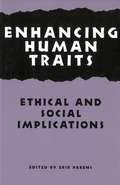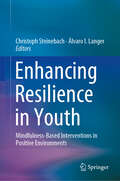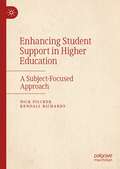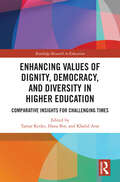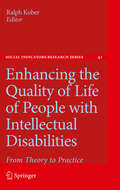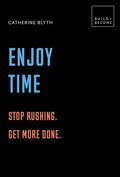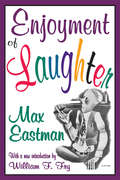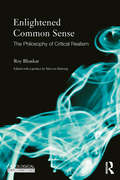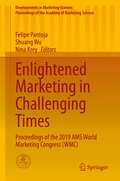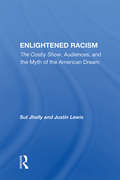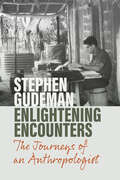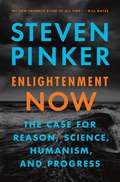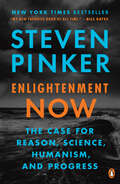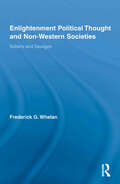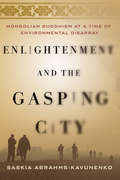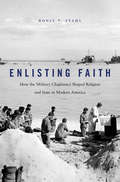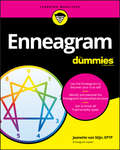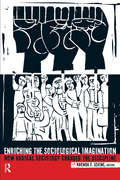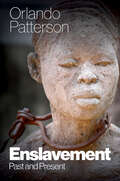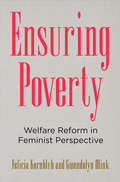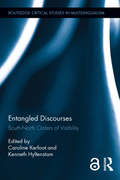- Table View
- List View
Enhancing Human Traits: Ethical and Social Implications
by Erik ParensIn this volume, scholars from philosophy, sociology, history, theology, women's studies, and law explore the looming ethical and social implications of new biotechnologies that are rapidly making it possible to enhance an individual's mental and physical attributes in ways previously only imagined. To clarify the issues, the contributors grapple with the central concept of "enhancement" and probe the uses and abuses of the term. Focusing in particular on the moral issues pertaining to cosmetic surgery and cosmetic psychopharmacology (a category which includes Prozac), they also examine notions of identity, authenticity, normality, and complicity. Other essays in this collection address the social ramifications of the new technologies, including the problems of access and fairness.
Enhancing Public Innovation by Transforming Public Governance
by Jacob Torfing Peter TriantafillouRising and changing citizen expectations, dire fiscal constraints, unfulfilled political aspirations, high professional ambitions, and a growing number of stubborn societal problems have generated an increasing demand for innovation of public policies and services. Drawing on the latest research, this book examines how current systems of public governance can be transformed in order to enhance public innovation. It scrutinizes the need for new roles and public sector reforms, and analyzes how the gradual transition towards New Public Governance can stimulate the exploration and exploitation of new and bold ideas in the public sector. It argues that the key to public innovation lies in combining and balancing elements from Classic Public Administration, New Public Management and New Public Governance, and theorizes how it can be enhanced by multi-actor collaboration for the benefit of public officials, private stakeholders, citizens, and society at large.
Enhancing Resilience in Youth: Mindfulness-Based Interventions in Positive Environments
by Christoph Steinebach Álvaro I. LangerThis book shows how to plan, refine, and implement peer-supported mindfulness-based interventions to prevent mental disorders in children and youths. It focuses on interventions designed to maintain psychosocial health and prevent emotional and behavioral problems in children and youths around the globe. By combining a range of research perspectives, the book connects mindfulness to pro-social behavior, and to positive social and physical environments, in order to enhance resilience. In addition, it presents theoretical aspects and practical recommendations on how to promote mental health and healthy lifestyles in adolescents, such as school-based interventions. Gathering contributions by an international network of researchers and practitioners, the book offers not only state-of-the-art theoretical descriptions of key concepts and interventions, but also best practices for implementing them to strengthen resilience.
Enhancing Student Support in Higher Education: A Subject-Focused Approach
by Nick Pilcher Kendall RichardsThis book is about supporting students in Higher Education using language, and specifically using a combination of written text based linguistic approaches alongside and with other non-text related languages. The authors call this a beyond-text subject based approach and argue that this can more effectively help students. The book first outlines and describes a ‘paradigm of linguistics’ that sees support as being only possible through linguistics written text approaches. It then describes how the authors have found through their own research studies that such approaches do not go far enough to best support students. They offer alternatives and justify them theoretically and empirically, and also suggest ways in which others can use similar approaches to best support students in HE. This book will be of interest to practitioners, students, teachers and researchers in the fields of Applied Linguistics, TESOL, English Medium Instruction (EMI), EAP and language education policy.
Enhancing Values of Dignity, Democracy, and Diversity in Higher Education: Comparative Insights for Challenging Times (Routledge Research in Higher Education)
by Tamar Ketko, Hana Bor, and Khalid ArarContesting a gradual disregard for the values of Dignity, Democracy, and Diversity in higher education, this volume explores best practices from universities and colleges in Israel and the USA to illustrate how these values can offer a holistic values framework for higher education globally. Presenting a range of interdisciplinary chapters from fields including history, philosophy, memorial studies, cultural, political, gender, and religious studies, the text considers how these values can be reflected in policy and practice across all areas of the university, including teaching and learning, admissions, students’ affairs, staff well-being, and institutional identity. The volume highlights constructive theories, experimental models, and case studies that collectively inform a holistic framework for moral, ethical, and equitable higher education worldwide. Offering key insights into the relevant discourse regarding local and global events that have impacted both Israelis and Americans, this volume will appeal to researchers in the fields of higher education, sociology of education, and philosophy of education, as well as postgraduates and scholars with interests in the transformation of higher education in light of contemporary times and challenges.
Enhancing the Quality of Life of People with Intellectual Disabilities
by Ralph KoberThis book contains a series of articles, written by international experts in the fields of intellectual disability and quality of life, that explore a broad range of issues that impact on the quality of life of people with intellectual disabilities and their families. The book commences with a general discussion on defining quality of life and family quality of life and the appropriateness of using these constructs in the field of intellectual disability, and is followed by an analysis on the effects of living arrangements and employment on quality of life. The book concludes with discussions on the unique issues facing children with intellectual disabilities and people living in developing countries and the effect these issues have upon their quality of life.
Enhancing the Role of Deaf Faculty Members in Higher Education: An International Comparison
by Manako YabeThis book is based on an international, mixed methods research project that conducted interviews with 25 deaf or hard-of-hearing (DHH) faculty members from mainstream universities and 19 university students who took classes taught by DHH faculty members and collected surveys from 57 DHH faculty members and 104 university students worldwide. The author reports on their experiences of accessibility at their institutions and makes recommendations based on the findings. The book will serve as a user guide or supplemental text for DHH faculty members, researchers, students, and academic interpreters, as well as university administrators and disability service directors who are looking to improve disability provision at their institutions.
Enjoy Time: Stop Rushing. Get More Done. (Build + Become)
by Catherine BlythGain a better understanding of the nature of time and learn how to manage your time and improve your life.We are living longer than ever and, thanks to technology, we are able to accomplish so much more. So why do we feel time poor? In twenty eye-opening lessons, Catherine Blyth combines cutting-edge science and psychology to show why time runs away from you, then provides the tools to get it back.Learn why the clock speeds up just when you wish it would go slow, how your tempo can be manipulated and why we all misuse and miscalculate time. But you can beat the time thieves. Reset your body clock, refurbish your routine, harness momentum and slow down. Not only will time be more enjoyable, but you really will get more done.
Enjoyment of Laughter
by Max EastmanHumor at its best is a somewhat fluid and transitory element, but most books about it are illustrated with hardened old jokes from the comic papers, or classic witticisms jerked out of their context. Max Eastman, in this work, avoids this catastrophe by quoting mainly from contemporary American humor. This is not an anthology in that selections have been made with a view to making a point rather than covering the field.The purpose of Eastman's fabled work is to make the reader laugh. Since his early school days, it has seemed to him that textbooks are wrongly written in that they are conducted in a way which ignores the natural operation of the mind. As a result, the opinion is universal, and under the circumstances a fact, that in order to learn anything you have to study. Since this introduction to humor is itself near to writing a textbook, Eastman uses the very text he constructs to illustrate the manner in which textbooks should be written.Examination and classification of the kinds of humorous experience upon the basis of a theory is a science. As such, this work offers a fair chance to illustrate a method of instruction. However, the distinction between a good joke and a bad one will not prevent the reader from making bad jokes nor enable one to make good ones. There is an artistic and playful element that simply cannot be taught. Enjoyment of Laughter presents a total view of the science of laughter and draws upon some of the great American humorists to do so.
Enlightened Common Sense: The Philosophy of Critical Realism
by Roy BhaskarSince the 1970s, critical realism has grown to address a range of subjects, including economics, philosophy, science, and religion. It has become a complex and mature philosophy. Enlightened Common Sense: The Philosophy of Critical Realism looks back over this development in one concise and accessible volume. The late Roy Bhaskar was critical realism’s philosophical originator and chief exponent. He draws on a lifetime’s experience to give a definitive, systematic account of this increasingly influential, international and multidisciplinary approach. Critical realism’s key element has always been its vindication and deepening of our understanding of ontology. Arguing that realist ontology is inexorable in knowledge and action, Bhaskar sees this as the key to a new enlightened common sense. From the definition of critical realism and its applicability in the social sciences, to explanation of dialectical critical realism and the philosophy of metaReality, this is the essential introduction for students of critical realism.
Enlightened Marketing in Challenging Times: Proceedings of the 2019 AMS World Marketing Congress (WMC) (Developments in Marketing Science: Proceedings of the Academy of Marketing Science)
by Nina Krey Shuang Wu Felipe PantojaThis volume explores the interconnection of social, political, technological and economic challenges that impact consumer relationships, new product launches and consumer interests. Featuring contributions presented at the 2019 Academy of Marketing Science (AMS) World Marketing Congress (WMC) held in Edinburgh, Scotland, the theme of this proceedings draws from the Scottish Enlightenment movement of the mid-Eighteenth Century, which centered on ideas of liberty, progress and the scientific method. The core values of this movement are being challenged by the rapidly changing, globally shifting and digitally connected world. The contributions presented in this volume reflect and reframe the roles of marketers and marketing in incorporating and advancing the ideas of the Scottish Enlightenment within contemporary marketing theory and practice.Founded in 1971, the Academy of Marketing Science is an international organization dedicated to promoting timely explorations of phenomena related to the science of marketing in theory, research, and practice. Among its services to members and the community at large, the Academy offers conferences, congresses, and symposia that attract delegates from around the world. Presentations from these events are published in this Proceedings series, which offers a comprehensive archive of volumes reflecting the evolution of the field. The series deliver cutting-edge research and insights, complementing the Academy’s flagship journals, the Journal of the Academy of Marketing Science (JAMS) and AMS Review (AMSR). Volumes are edited by leading scholars and practitioners across a wide range of subject areas in marketing science.
Enlightened Racism: The Cosby Show, Audiences, And The Myth Of The American Dream
by Sut JhallyThe Cosby Show needs little introduction to most people familiar with American popular culture. It is a show with immense and universal appeal. Even so, most debates about the significance of the program have failed to take into account one of the more important elements of its success—its viewers. Through a major study of the audiences of The Cosby Show, the authors treat two issues of great social and political importance—how television, America's most widespread cultural form, influences the way we think, and how our society in the post-Civil Rights era thinks about race, our most widespread cultural problem. This book offers a radical challenge to the conventional wisdom concerning facial stereotyping in the United States and demonstrates how apparently progressive programs like The Cosby Show, despite good intentions, actually help to construct "enlightened" forms of racism. The authors argue that, in the post-Civil Rights era, a new structure of racial beliefs, based on subtle contradictions between attitudes toward race and class, has brought in its wake this new form of racial thought that seems on the surface to exhibit a new tolerance. However, professors Jhally and Lewis find that because Americans cannot think clearly about class, they cannot, after all, think clearly about race. This groundbreaking book is rooted in an empirical analysis of the reactions to The Cosby Show of a range of ordinary Americans, both black and white. Professors Jhally and Lewis discussed with the different audiences their attitudes toward the program and more generally their understanding and perceptions of issues of race and social class. Enlightened Racism is a major intervention into the public debate about race and perceptions of race—a debate, in the 1990s, at the heart of American political and public life. This book is indispensable to understanding that debate.
Enlightening Encounters: The Journeys of an Anthropologist
by Stephen GudemanOne of the world's top anthropologists recounts his formative experiences doing fieldwork in this accessible memoir ideal for anyone interested in anthropology. Drawing on his research in five Latin American countries, Steve Gudeman describes his anthropological fieldwork, bringing to life the excitement of gaining an understanding of the practices and ideas of others as well as the frustrations. He weaves into the text some of his findings as well as reflections on his own background that led to better fieldwork but also led him astray. This readable account, shorn of technical words, complicated concepts, and abstract ideas shows the reader what it is to be an anthropologist enquiring and responding to the unexpected. From the Preface: Growing up I learned about making do when my family was putting together a dinner from leftovers or I was constructing something with my father. In fieldwork I saw people making do as they worked in the fields, repaired a tool, assembled a meal or made something for sale. Much later, I realized that making do captures some of my fieldwork practices and their presentation in this book.
Enlightenment Now: The Case for Reason, Science, Humanism, and Progress
by Steven PinkerIs the world really falling apart? Is the ideal of progress obsolete? In this elegant assessment of the human condition in the third millennium, cognitive scientist and public intellectual Steven Pinker urges us to step back from the gory headlines and prophecies of doom, which play to our psychological biases. Instead, follow the data: In seventy-five jaw-dropping graphs, Pinker shows that life, health, prosperity, safety, peace, knowledge, and happiness are on the rise, not just in the West, but worldwide. This progress is not the result of some cosmic force. It is a gift of the Enlightenment: the conviction that reason and science can enhance human flourishing. Far from being a naïve hope, the Enlightenment, we now know, has worked. But more than ever, it needs a vigorous defense. The Enlightenment project swims against currents of human nature--tribalism, authoritarianism, demonization, magical thinking--which demagogues are all too willing to exploit. Many commentators, committed to political, religious, or romantic ideologies, fight a rearguard action against it. The result is a corrosive fatalism and a willingness to wreck the precious institutions of liberal democracy and global cooperation. With intellectual depth and literary flair, Enlightenment Now makes the case for reason, science, and humanism: the ideals we need to confront our problems and continue our progress.
Enlightenment Now: The Case for Reason, Science, Humanism, and Progress
by Steven Pinker<P> If you think the world is coming to an end, think again. Steven Pinker presents the big picture of human progress: people are living longer, healthier, freer, and happier lives, and while our problems are formidable, the solutions lie in the Enlightenment ideal of using reason and science.Is the world really falling apart? Is the ideal of progress obsolete? <P> In this elegant assessment of the human condition in the third millennium, cognitive scientist and public intellectual Steven Pinker urges us to step back from the gory headlines and prophecies of doom, which play to our psychological biases. <P>Instead, follow the data: In seventy-five jaw-dropping graphs, Pinker shows that life, health, prosperity, safety, peace, knowledge, and happiness are on the rise, not just in the West, but worldwide. This progress is not the result of some cosmic force. It is a gift of the Enlightenment: the conviction that reason and science can enhance human flourishing.Far from being a naïve hope, the Enlightenment, we now know, has worked. But more than ever, it needs a vigorous defense. <P>The Enlightenment project swims against currents of human nature--tribalism, authoritarianism, demonization, magical thinking--which demagogues are all too willing to exploit. Many commentators, committed to political, religious, or romantic ideologies, fight a rearguard action against it. The result is a corrosive fatalism and a willingness to wreck the precious institutions of liberal democracy and global cooperation. With intellectual depth and literary flair, Enlightenment Now makes the case for reason, science, and humanism: the ideals we need to confront our problems and continue our progress. <P><b>A New York Times Bestseller</b>
Enlightenment Political Thought and Non-Western Societies: Sultans and Savages (Routledge Studies in Social and Political Thought)
by Frederick G. WhelanFrederick G. Whelan, a leading scholar of Enlightenment political thought, provides an illuminating and incisive interpretation of key eighteenth and nineteenth century European political thinkers' accounts and assessments of the societies and political institutes of the non-Western world. These writers opened up a major new comparative dimension for political theory and its project both to explain and evaluate different political regimes. While the intellectual confrontation of European thinkers with alien cultures tended on the whole to confirm Westerners' sense of the superiority of their own institutions, it was also characterized – during the Enlightenment more so than later – by convictions regarding a common humanity and a corresponding sympathetic curiosity about different ways of life, however primitive or exotic they might appear. This book will be of interest to students and scholars of both political philosophy and thought as well as historians of this important period of history.
Enlightenment and the Gasping City: Mongolian Buddhism at a Time of Environmental Disarray
by Saskia Abrahms-KavunenkoWith air pollution now intimately affecting every resident of Ulaanbaatar, the capital of Mongolia, Saskia Abrahms-Kavunenko seeks to understand how, as a physical constant throughout the winter months, the murky and obscuring nature of air pollution has become an active part of Mongolian religious and ritual life. Enlightenment and the Gasping City identifies air pollution as a boundary between the physical and the immaterial, showing how air pollution impresses itself on the urban environment as stagnation and blur. She explores how air pollution and related phenomena exist in dynamic tension with Buddhist ideas and practices concerning purification, revitalisation and enlightenment. By focusing on light, its intersections and its oppositions, she illuminates Buddhist practices and beliefs as they interact with the pressing urban issues of air pollution, post-socialist economic vacillations, urban development, nationalism, and climate change.
Enlightenment in an Age of Destruction
by Christopher Britt Paul Fenn Eduardo SubiratsThis book is about the ways in which modern enlightenment, rather than liberating humanity from tyranny, has subjected us to new servitude imposed by systems of mass manipulation, electronic vigilance, compulsive consumerism, and the horrors of a seemingly unending global war on terror. The main intellectual aims of this title are the following: the analysis of spectacle, the criticism of providential enlightenment, and the examination of positive dialectics. The spectacle, in this case, is the apotheosis of the culture industries, a total inversion of reality and of our existences. Providential enlightenment is not only a critique of the failure of enlightenment, but of the mutilation of historical enlightenments. Positive dialectics signal a new era of intellectual engagement in the construction of our historical future. During a time in which national democracies seem an imperial farce, it is not enough for intellectuals faced with all this destruction to blithely recommend resistance. The book thus ties American, British, French and German theoretical traditions into a reflexive challenge to the notion of intellectual as critic, and argues instead for a trespassive tradition of cultural leadership.
Enlisting Faith: How the Military Chaplaincy Shaped Religion and State in Modern America
by Ronit Y. StahlRonit Stahl traces the ways the U.S. military struggled with, encouraged, and regulated religious pluralism and scrambled to handle the nation’s deep religious, racial, and political complexity. Just as the state relied on religion to sanction combat missions and sanctify war deaths, so too did religious groups seek validation as American faiths.
Enneagram For Dummies
by Jeanette van StijnDiscover who you are and unlock your potential with the power of the EnneagramFans of Myers Briggs, The Five Love Languages, and Everything DiSC are loving the Enneagram test. The Enneagram is a personality typing system that describes patterns in how people interpret the world, manage their emotions, and experience their inner lives. The Enneagram describes nine different personality types and maps each of these types on a nine-pointed diagram to illustrate how each type relates to one another. From bestselling books, popular podcasts, online courses, workshops, even around the dinner table, the Enneagram is having a moment and is likely here to stay.But what does your number represent? Are you a three, a seven, a nine, or something in between? And how do you use your Enneagram number to better relate to loved ones, friends, and colleagues? Enneagram For Dummies is here to help. Written by Enneagram expert and author Jeanette van Stijn, Enneagram For Dummies offers a step-by-step approach for using the Enneagram as a tool for personal transformation and development.You'll discover: Which Enneagram type best matches your personality Advice on overcoming challenges that your personality type often faces Interpersonal skills you should develop to succeed with people of other Enneagram personality types Ways to use your knowledge of Enneagram types to navigate the twists and turns of the workplace How the Enneagram aligns itself with many of the world's spiritual traditions Whether you're the Helper, the Investigator, the Peacemaker, or another personality type altogether, Enneagram For Dummies shows you how to overcome your inner barriers, recognize your unique gifts and strengths, and truly connect with the world around you.
Enriching the Sociological Imagination: How Radical Sociology Changed the Discipline
by Rhonda F. LevineSince the 1960s, radical sociology has had far more influence on mainstream sociology than many observers imagine. This book pairs seminal articles with new reflective essays written by the founders of progressive sociology, including Fred Block, Edna Bonacich, Samuel Bowles, Herbert Gintis, Val Burris, G. William Domhoff, Richard Flacks, Harvey Molotch, Goran Therborn, and Erik Olin Wright. The book highlights the wider impact of radical sociology and shows how the work of these and other writers has continued to influence sociology's continuing interest in capitalism, class, race, gender, power, and progressive social change. It also describes future directions for a critical sociology relevant to a multicultural and global world.
Enrichment: A Critique of Commodities
by Luc Boltanski Arnaud EsquerreThis book offers a major new account of modern capitalism and of the ways in which value and wealth are created today. Boltanski and Esquerre argue that capitalism in the West has recently undergone a fundamental transformation characterized by de-industrialization, on the one hand, and, on the other, by the increased exploitation of certain resources that, while not entirely new, have taken on unprecedented importance. It is this new form of exploitation that has given rise to what they call the ‘enrichment economy’. The enrichment economy is based less on the production of new objects and more on the enrichment of things and places that already exist. It has grown out of a combination of many different activities and phenomena, all of which involve, in their varying ways, the exploitation of the past. The enrichment economy draws upon the trade in things that are intended above all for the wealthy, thus providing a supplementary source of enrichment for the wealthy people who deal in these things and exacerbating income inequality. As opportunities to profit from the exploitation of industrial labour began to diminish, capitalism shifted its focus to expand the range of things that could be exploited. This gave rise to a plurality of different forms for making things valuable – valuing objects in terms of their properties is only one such form. The form that plays a central role in the enrichment economy is what the authors call the ‘collection form’, which values objects based on the gap they fill in a collection. This valuation process relies on the creation of narratives which enrich commodities. This wide-ranging and highly original work makes a major contribution to our understanding of contemporary societies and of how capitalism is changing today. It will be of great value to students and scholars in sociology, political economy and cultural studies, as well as to anyone interested in the social and economic transformations shaping our world.
Enslavement: Past and Present
by Orlando PattersonSlavery is one of humanity’s most ancient and persistent inequities. It predates the rise of civilization, played a key role in the growth of Western and Islamic cultures and was an integral part of the emergence and global spread of capitalism. Given its historical significance, it is not surprising that the problem of slavery is still passionately debated today and that modern-day trafficking and forced servitude remain key issues of public concern.In Enslavement: Past and Present, historical sociologist Orlando Patterson casts a wide net to examine the social, political, and economic complexities of slavery across different eras and societies. Patterson examines slavery at several levels of abstraction, from micro-level relations of domination to the macro-structures of entire societies. Building on the 'bundle of rights' perspective, he reevaluates the definition of slavery, exposing its variegated fabric of iniquities across tribal and advanced pre-modern societies as well as our modern globalized age. Patterson also examines the critical role of women in the history of slavery, the significance of manumission in the formation of Christian doctrine, and the devastating toll of genocide and undaunted revolt of slaves in Jamaican slave society. Concluding with an investigation of contemporary slavery and other forms of servitude, this book urges readers to reckon with the brutal legacies of the past and its alarming modern-day persistence.Enslavement: Past and Present deepens our understanding of the broad spectrum of evil and human bondage throughout history, an understanding that is essential for contemporary struggles to build a more inclusive society for all.
Ensuring Poverty: Welfare Reform in Feminist Perspective
by Felicia Kornbluh Gwendolyn MinkIn Ensuring Poverty, Felicia Kornbluh and Gwendolyn Mink assess the gendered history of welfare reform. They foreground arguments advanced by feminists for a welfare policy that would respect single mothers' rights while advancing their opportunities and assuring economic security for their families. Kornbluh and Mink consider welfare policy in the broad intersectional context of gender, race, poverty, and inequality. They argue that the subject of welfare reform always has been single mothers, the animus always has been race, and the currency always has been inequality. Yet public conversations about poverty and welfare, even today, rarely acknowledge the nexus between racialized gender inequality and the economic vulnerability of single-mother families.Since passage of the Personal Responsibility and Work Opportunity Reconciliation Act (PRWORA) by a Republican Congress and the Clinton administration, the gendered dimensions of antipoverty policy have receded from debate. Mink and Kornbluh explore the narrowing of discussion that has occurred in recent decades and the path charted by social justice feminists in the 1990s and early 2000s, a course rejected by policy makers. They advocate a return to the social justice approach built on the equality of mothers, especially mothers of color, in policies aimed at poor families.
Entangled Discourses: South-North Orders of Visibility (Routledge Critical Studies in Multilingualism)
by Kenneth Hyltenstam Caroline KerfootThis book uniquely explores the shifting structures of power and unexpected points of intersection – entanglements – at the nexus of North and South as a lens through which to examine the impact of global and local circuits of people, practices and ideas on linguistic, cultural and knowledge systems. The volume considers the entanglement of North and South on multiple levels in the contemporary and continuing effects of capitalism, colonialism, and imperialism, in the form of silenced or marginalized populations, such as refugees, immigrants, and other minoritised groups, and in the different orders of visibility that make some types of practices and knowledge more legitimate and therefore more visible. It uses a range of methodological and analytical frames to shed light on less visible histories, practices, identities, repertoires, and literacies, and offer new understandings for research and for language, health care, education, and other policies and practices. The book brings together an exciting mix of voices of both established and new scholars in multilingualism and diversity from a range of social, political, and historical contexts and provides coverage of areas previously underrepresented in current research on multilingualism, globalization, and mobility, including Brazil, South Africa, Australia, East Timor, Wallis and Mayotte, Cape Verde and Guinea-Bissau. This volume is key reading for scholars, researchers, and graduate students in multilingualism, globalisation, sociolinguistics, mobility and development studies, applied linguistics, and language and education policy.
